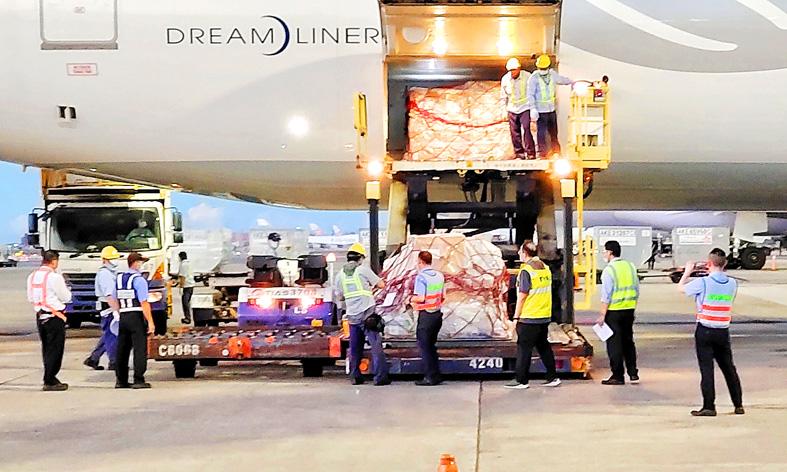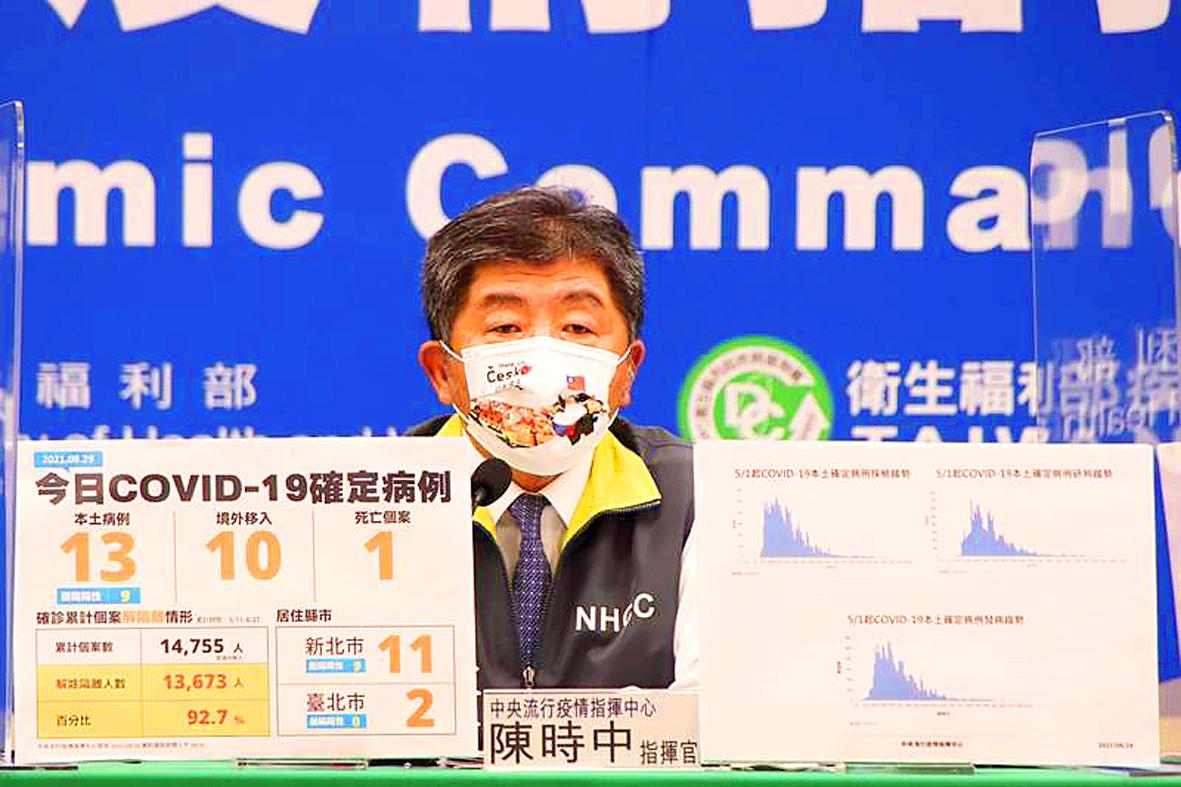The Central Epidemic Command Center (CECC) yesterday reported 13 locally transmitted infections, 10 imported COVID-19 cases and one death.
Minister of Health and Welfare Chen Shih-chung (陳時中), who heads the center, said that following two consecutive days of no local infections, 13 new cases were confirmed, including nine people who tested positive during isolation.
Eleven cases were reported in New Taipei City and two in Taipei, he said.

Photo: Tony Yao, Taipei Times
Ten of the cases in New Taipei City are family members who live in the same household in Sansia District (三峽), and the other is a worker at the Mega City (大遠百) shopping mall in Banciao District (板橋), Chen said, adding that expanded testing is being conducted among mall employees.
The infection sources of nine people in the family cluster have been found, while contact tracing continued to identify the infection sources of the remaining four cases, he added.
The first case in the family cluster is a man who had been hospitalized from the middle of June to early last month, Chen said.

Photo courtesy of Central Epidemic Command Center
The man tested negative at the time, but was tested again before a recent examination at a hospital. After the man tested positive, his family members were placed under isolation, he said.
Only one member of the family, a child, did not test positive for COVID-19, Chen said, adding that the infected family members are aged two to older than 50.
The one death that was confirmed yesterday was a cargo ship captain, whose case was reported last week, Chen said.
The 10 imported cases came from China, Cambodia, Myanmar, Pakistan, Vietnam and the US, he said.
Six of them had received their first dose of a COVID-19 vaccine, and the other four were fully vaccinated, said Centers for Disease Control (CDC) Deputy Director-General Philip Lo (羅一鈞), deputy head of the CECC’s medical response division.
Of the four, one had received three doses of the Chinese-made ZF2001 vaccine, an adjuvanted protein subunit vaccine; one had received two doses of the Chinese-made Sinovac (科興生物) vaccine; one had received US firm Johnson & Johnson’s single-dose Janssen vaccine; and one had received two doses of the Indian-made Covaxin vaccine.
Chen also provided an update about a breakthrough infection reported on Saturday — a pilot at a Taiwanese airline who had received two doses of the AstraZeneca COVID-19 vaccine.
Twenty-one close contacts of the pilot have tested negative, while two are awaiting test results and five are to be tested, Chen said.
The center suspects there might be loopholes in the implementation of the procedures to protect flight crews from COVID-19 infection during overseas flights, he said.
The procedures would be reviewed, Chen said, adding that quarantine rules for flight crew members would likely be tightened.
Meanwhile, a shipment of 30,000 Moderna COVID-19 vaccine doses donated by the Czech Republic arrived in Taiwan yesterday afternoon.
“We are very grateful for the donation... When many countries around the world are facing vaccine shortages, the Czech Republic is still willing to express its friendship, which is very helpful to the people of Taiwan,” Chen said.
Chen and the other CECC officials at the daily news briefing wore masks that bore the message “Thank you Cesko,” and the national flags of Taiwan and the Czech Republic.
In related news, more than 1.97 million people had added the Pfizer-BioNTech COVID-19 vaccine to their preferred vaccine brands three hours after registration opened on the national online COVID-19 vaccination system at 2pm on Saturday.
The number had increased to 2.88 million people as of 2pm yesterday, the center said.
The nation’s first-dose vaccination coverage rate reached 42.55 percent on Saturday, it added.

The Central Election Commission has amended election and recall regulations to require elected office candidates to provide proof that they have no Chinese citizenship, a Cabinet report said. The commission on Oct. 29 last year revised the Measures for the Permission of Family-based Residence, Long-term Residence and Settlement of People from the Mainland Area in the Taiwan Area (大陸地區人民在台灣地區依親居留長期居留或定居許可辦法), the Executive Yuan said in a report it submitted to the legislature for review. The revision requires Chinese citizens applying for permanent residency to submit notarial documents showing that they have lost their Chinese household record and have renounced — or have never

A magnitude 5.6 earthquake struck off the coast of Yilan County at 12:37pm today, with clear shaking felt across much of northern Taiwan. There were no immediate reports of damage. The epicenter of the quake was 16.9km east-southeast of Yilan County Hall offshore at a depth of 66.8km, Central Weather Administration (CWA) data showed. The maximum intensity registered at a 4 in Yilan County’s Nanao Township (南澳) on Taiwan’s seven-tier scale. Other parts of Yilan, as well as certain areas of Hualien County, Taipei, New Taipei City, Taoyuan, Hsinchu County, Taichung and Miaoli County, recorded intensities of 3. Residents of Yilan County and Taipei received

Taiwan has secured another breakthrough in fruit exports, with jujubes, dragon fruit and lychees approved for shipment to the EU, the Ministry of Agriculture said yesterday. The Animal and Plant Health Inspection Agency on Thursday received formal notification of the approval from the EU, the ministry said, adding that the decision was expected to expand Taiwanese fruit producers’ access to high-end European markets. Taiwan exported 126 tonnes of lychees last year, valued at US$1.48 million, with Japan accounting for 102 tonnes. Other export destinations included New Zealand, Hong Kong, the US and Australia, ministry data showed. Jujube exports totaled 103 tonnes, valued at

BIG SPENDERS: Foreign investors bought the most Taiwan equities since 2005, signaling confidence that an AI boom would continue to benefit chipmakers Taiwan Semiconductor Manufacturing Co’s (TSMC, 台積電) market capitalization swelled to US$2 trillion for the first time following a 4.25 percent rally in its American depositary receipts (ADR) overnight, putting the world’s biggest contract chipmaker sixth on the list of the world’s biggest companies by market capitalization, just behind Amazon.com Inc. The site CompaniesMarketcap.com ranked TSMC ahead of Saudi Aramco and Meta Platforms Inc. The Taiwanese company’s ADRs on Tuesday surged to US$385.75 on the New York Stock Exchange, as strong demand for artificial intelligence (AI) applications led to chip supply constraints and boost revenue growth to record-breaking levels. Each TSMC ADR represents